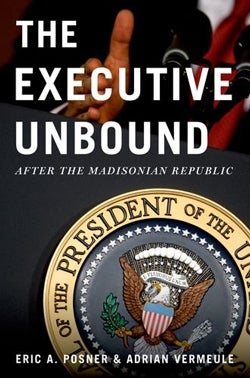Where should the line be drawn on executive power? Harvard Law School Professor Adrian Vermeule ’93 and University of Chicago Law Professor Eric A. Posner ’91 examine the current state and the future of the U.S. presidency and Constitution through the context of historical authorities in their new book, “The Executive Unbound: After the Madisonian Republic” (Oxford University Press, 2011).
Vermeule and Posner predict a stronger executive power, or presidentialist democracy, that will bring an effective end to the “Madisonian republic of separated powers,” without “degenerating into some sort of Caesarism,” Vermeule writes in a recent guest post about the book, on the blog of Yale Law School Professor Jack M. Balkin ’81.
He writes: “We envision the Constitution in 2020 as a plebiscitary, president-centered electoral democracy in which Congress and the courts have been reduced to marginal actors, who carp from the sidelines but for the most part end up deferring to executive power, if only because the executive is the least dysfunctional branch.”
Vermeule and Posner show that the executive branch has become increasingly powerful in recent years, especially vis a vis Congress. President Clinton defied the War Powers Resolution in his decision to begin a bombing campaign in Kosovo; President Bush claimed broad powers in the Authorization to use Military Force in Iraq; the presidential agenda increasingly occupies Congress’s time, meaning that the President now directs more policy than the legislative branch, the authors observe.
Although the Founding Fathers tried to prevent just such an accretion of power in the executive branch, Vermeule and Posner argue that anxieties about executive tyranny are unwarranted. There is nothing in the Madisonian idea of checks and balances that intrinsically generates order or promotes positives arrangements, they write. Moreover, in the modern era, a high concentration of power in the White House is unavoidable. Not only has the ‘imperial presidency’ become inevitable, it must be accepted, they argue. The complexity of economic policy and the need for secrecy in matters of national security and foreign affairs make legislative and judicial oversight less feasible than in the past—especially when there is a need for speedy action.
The authors’ view is that the American public can and should focus on how to curb executive abuses through more modern kinds of checks and balances, such as media exposure, public opinion and party competition instead of the increasingly obsolete legal checks of the Madisonian constitution.
Vermeule is the John H. Watson, Jr. Professor of Law, and his most recent books include “Law and the Limits of Reason” and “Mechanisms of Democracy: Institutional Design Writ Small.” He and Posner, who is on the faculty of the University of Chicago Law School, are also the co-authors of “Terror in the Balance: Security, Liberty and the Courts.”
